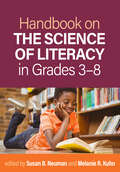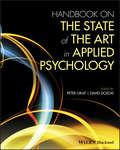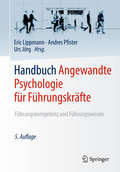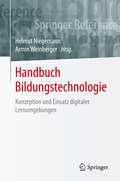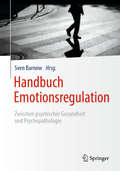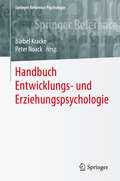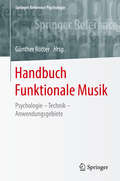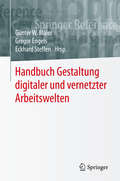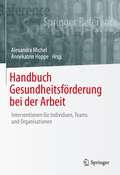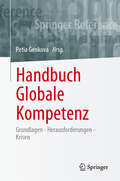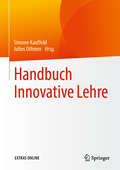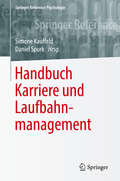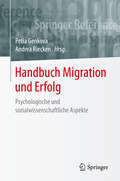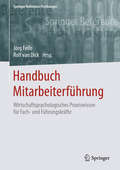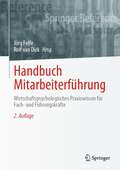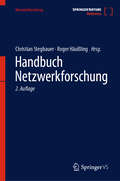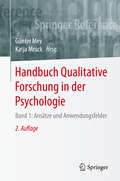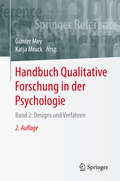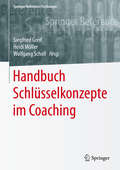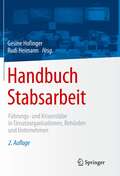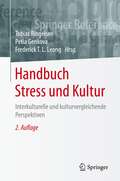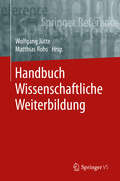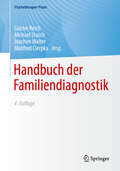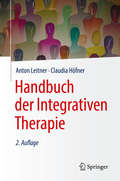- Table View
- List View
Handbook on the Science of Literacy in Grades 3-8
by Sharon Vaughn Susan B. Neuman Melanie R. KuhnFrom foremost authorities, this needed work demonstrates the importance of a science of literacy perspective for teaching and learning beyond the primary grades. Contributors present cutting-edge research on reading and writing development in grades 3–8 and review evidence-based classroom practices and professional learning frameworks. The Handbook explores how to support upper elementary and middle grades learners in improving morphological knowledge and vocabulary, understanding text complexity, and building comprehension. It describes effective ways to meet the instructional needs of struggling readers and writers, including multilingual students and those with learning disabilities. Timely topics include multi-tiered systems of support, student motivation and engagement, adaptive teaching, digital and multimodal literacies, and culturally responsive and sustaining practices.
Handbook on the State of the Art in Applied Psychology
by Peter Graf David J. A. DozoisLearn the most up-to-date developments in applied psychology with one authoritative collection The Handbook on the State of the Art in Applied Psychology delivers 19 state-of-the-art addresses on a selected topic in applied psychology. Together, they constitute an up-to-date and authoritative reference that describes the most cutting-edge material in the most prominent domains of applied psychology. The accomplished academics and editors Dr. Peter Graf and Dr. David Dozois put the focus on areas where the most profound recent progress has been made. They also emphasize the link between science and practice, showcasing basic science research that has practical implications for real world problems. Readers will benefit from up-to-date research on topics as varied as occupational commitment and organizational productivity, forgiveness, shared cultural spaces, environmental decision making, and the early identification of reading problems. In addition to the papers included in the collection, the Handbook on the State of the Art in Applied Psychology features: An insightful preface focused on the theme of connecting basic research to practical solutions in the real world An overview of the chapters and their arrangement in the collection An author and subject index to assist readers in finding the information they seek A focus on the most cutting-edge advancements in the field of applied psychology, with an emphasis on the impact of technological innovation and increased recognition of cultural determinants of behavior Perfect for applied psychology researchers, workers, teachers, and students around the world, Handbook on the State of the Art in Applied Psychology also belongs on the bookshelves of anyone looking for an efficient way to get up to speed on the latest developments on a wide variety of relevant topics in applied psychology.
Handbuch Angewandte Psychologie für Führungskräfte: Führungskompetenz und Führungswissen
by Eric Lippmann Andres Pfister Urs Jörg Tobias LeuenbergerDas erfolgreiche Handbuch für Praktiker - bislang bekannt als "der Steiger-Lippmann" - fasst das gesamte, für Führungskräfte aller Ebenen relevante Wissen der Psychologie in einem Werk zusammen und ist, nun schon in der 5. Auflage mit neuem Herausgeberteam, ein bewährter Wegweiser in allen Führungssituationen, wie ein Blick auf die Themen des Buches zeigt: Leistungsbeeinflussung, Führung der eigenen Person, Kommunikation, Teamführung, Recruiting, Personalentwicklung, Motivation, Projektmanagement, Change Management, Konfliktmanagement, Coaching u.v.m. - all das funktioniert im Alltag nicht ohne Know-how aus der Psychologie! Auch zeitaktuelle Themen wie Umgang mit Verhaltensauffälligkeiten, Burnout etc., Managing Diversity, Virtuelle Führung oder Einsatz von Social Media u.a. sind enthalten.Eine sorgfältige didaktische Aufbereitung des Textes mit Checklisten, Fallbeispielen, Leitfragen, Arbeitsblättern u.a. erleichtert das Lesen.Herausgeber und Autoren sind erfahrene Praktiker in der Führungskräfteentwicklung und Dozenten am renommierten IAP Institut für Angewandte Psychologie in Zürich.
Handbuch Bildungstechnologie: Konzeption und Einsatz digitaler Lernumgebungen
by Armin Weinberger Helmut NiegemannDas Handbuch vermittelt einen umfassenden Überblick über den aktuellen Erkenntnisstand zu Ansätzen und Befunden zur systematischen Gestaltung von Lernumgebungen in deutscher Sprache. Es präsentiert theoretische und methodische Grundlagen der Forschungsdisziplin Bildungstechnologie und stellt darüber hinaus konkrete Überlegungen an, wie diese wissenschaftlichen Grundlagen in praktischen Lehr-Lern-Kontexten umgesetzt werden können. Neben der systematischen Konzeption von Lernangeboten (Instructional Design) liegt ein weiterer Schwerpunkt beim Einsatz aktueller Informations- und Kommunikationstechnik, insbesondere digitaler, interaktiver Medien im Bildungswesen.
Handbuch Emotionsregulation: Zwischen psychischer Gesundheit und Psychopathologie
by Sven BarnowDieses Handbuch gibt einen fundierten Überblick über das aktuelle Wissen zum Thema Emotionsregulation. Grundlagen- und Anwendungswissen werden zusammengeführt, so dass Forscher/innen und Praktiker/innen den aktuellen Wissensstand nachlesen und sich an den neusten Befunden orientieren können. Geschrieben für alle, die sich einen umfassenden Überblick zum Thema Emotionsregulation verschaffen wollen (u. a. Psychologische und Ärztliche Psychotherapeut/inn/en, Psychiater/innen und Ärzte für Psychosomatische Medizin, Student/inn/en der Psychologie und Medizin, Wissenschaftler/innen mit Fokus Emotionsregulation). Aus dem Inhalt: I Modelle, Konzepte und Messung von Emotionsregulation (ER) – II Genetik und Neurobiologie der ER – III Schnittstelle Kognition und ER – IV Interpersonelle ER (ER im Kontext von Dyaden und Gruppen) – V ER bei psychischen Störungen und in der Psychotherapie – VI Zusammenfassung und Implikationen für Forschung und Praxis. Der Herausgeber: Prof. Dr. Sven Barnow leitet den Lehrstuhl für Klinische Psychologie und Psychotherapie am Psychologischen Institut der Ruprecht-Karls-Universität Heidelberg. Er hat eine Vielzahl von wissenschaftlichen Publikationen und mehrere Bücher verfasst. Seine Forschung zur Emotionsregulation beinhaltet u. a. die Grundlagen, Messung und Bedeutung der Emotionsregulation für psychische Gesundheit und Psychopathologie.
Handbuch Entwicklungs- und Erziehungspsychologie (Springer Reference Psychologie)
by Bärbel Kracke Peter NoackEine Vielzahl von Faktoren wie Mobilität, Migration, Inklusion, berufliche Übergänge und Medien prägen heutige individuelle Entwicklungs- und Erziehungsprozesse. Das Handbuch gibt einen umfassenden Einblick in diese und andere zentrale Aspekte der individuellen Entwicklung und Erziehung über die gesamte Lebensspanne. Es führt dabei Grundlagenwissen mit Anwendungsperspektiven und Praxisbeispielen zusammen. Ein Schwerpunkt der Darstellung liegt auf den Kontexten individueller Entwicklungsverläufe in den verschiedenen Lebensphasen und der Erziehung. Hintergrund dafür ist, dass Stabilität und Veränderung der Person ohne deren Wechselwirkung mit Familie, Peers oder Bildungseinrichtungen nicht angemessen zu verstehen sind. Gleichzeitig werden auch die Bedingungen des heutigen gesellschaftlichen Umfelds in den Blick genommen. Ein Beispiel ist die zunehmende Diversität und die damit verbundene Frage nach einem erzieherischen Umgang mit Unterschiedlichkeit, der dem Individuum in seiner Entwicklung in förderlicher Weise gerecht wird. Das Handbuch ist ideal für angehende wie schon tätige Praktiker und Professionals in verschiedenen Anwendungsfeldern. Gleichzeitig bietet es Studierenden der Psychologie, der Erziehungswissenschaft und benachbarter Disziplinen einen verständlich aufbereiteten Überblick zu wichtigen und aktuellen Themen der ökologischen Entwicklungspsychologie.
Handbuch Essstörungen und Adipositas
by Stephan Herpertz Stephan Zipfel Martina De ZwaanIn diesem Buch wird das gesamte Spektrum der Essstörungen, inklusive der Adipositas, schulenunabhängig und basierend auf den neuesten Therapieleitlinien behandelt. Alle Störungsbilder werden auf Grundlage der aktuellen Datenlage erläutert; Behandlungswege werden aufgezeigt, die psychotherapeutische und ergänzende pharmakologische Interventionen verknüpfen, um den Therapeutinnen und Therapeuten klare Handlungsempfehlungen zu geben.Die 3. Auflage wurde vollständig überarbeitet und um wichtige aktuelle Themen und Kapitel ergänzt, wie z. B. die Eingliederung der Essstörungen in ICD 11/DSM 5, die Rolle des Mikrobioms und den Einsatz moderner Medien in Prävention und Therapie. Des Weiteren greifen Herausgeber und Autoren u.a. die systemische Therapie als neue Richtlinienpsychotherapie und die Diskussion rund um Suchtmechanismen bei Ess- und Gewichtsstörungen auf und geben einen Ausblick auf die Rolle der Neurostimulationsverfahren, um aktuellen Entwicklungen im Bereich Adipositas und Essstörungen Rechnung zu tragen.Als Nachschlagewerk ist das Buch sowohl für angehende Ärzte, Pädagogen und Psychologen, insbesondere Psychosomatiker, Psychiater und Psychotherapeuten in Klinik und Praxis geeignet.
Handbuch Funktionale Musik
by Günther RötterDas vorliegende Handbuch gibt nicht nur einen Überblick über den aktuellen Forschungsstand, sondern zeigt außerdem die Möglichkeiten und Grenzen des Einsatzes Funktionaler Musik auf. Neben der Theorie soll insbesondere die gegenwärtige Praxis berücksichtigt werden. Dies wird durch die Auswahl der Autorinnen und Autoren deutlich, die sowohl aus der Wissenschaft, als auch der Industrie und dem therapeutischen sowie künstlerischen Bereich entstammen. Das Werk wendet sich damit zum einen an einen wissenschaftlichen Leserkreis, zum anderen aber auch an Personen, die sich mit der praktischen Anwendung Funktionaler Musik befassen.
Handbuch Gestaltung digitaler und vernetzter Arbeitswelten (Springer Reference Psychologie Ser.)
by Gregor Engels Günter W. Maier Eckhard SteffenDieses interdisziplinäre Handbuch richtet sich an all diejenigen, die den digitalen Wandel, der im Zusammenhang mit der vierten industriellen Revolution (Industrie 4.0) diskutiert wird, in Betrieben, Verwaltungen und der Gesellschaft besser verstehen und aktiv gestalten möchten. Die einzelnen Beiträge veranschaulichen die vielfältigen Perspektiven unterschiedlicher Disziplinen (z.B. Ingenieur-, Rechts- und Wirtschaftswissenschaften, Informatik, Psychologie, Soziologie, Erziehungswissenschaft u.a.) oder Interessensgruppen (z.B. Gewerkschaften) auf die Folgen der Digitalisierung im Arbeitsleben für Mensch, Organisation und Gesellschaft. Das gesamte Werk schlägt eine Brücke von aktuellen Forschungsergebnissen hin zu praktischen Umsetzungshinweisen. Im Zentrum stehen drei zentrale Fragen zur Digitalisierung des Arbeitslebens, und zwar woran man sich bei der Gestaltung orientieren, wie die Transformation gestaltet werden und worauf sich die Digitalisierung auswirken kann. Beispielthemen dieser 3 Bereiche: 1. Im Zusammenhang mit den Gestaltungskriterien: sichere und gesundheitsförderliche Gestaltung der digitalen Arbeitsweltarbeitsrechtliche Aspektepsychologische Arbeitsgestaltung digitaler Arbeitswelten 2. Im Zusammenhang mit der Art und Weise des Wandels von analogen zu digitalen Arbeitswelten: Chancen für gesundheitsorientierte Arbeitsgestaltung durch körpernahe und tragbare Sensorik neue Aufgabenverteilung durch kollaborative Roboter im Rahmen der Mitbestimmung Prozesse durch proaktive betriebliche Interessensvertretung gestalten 3. Im Zusammenhang mit den Konsequenzen: Auswirkungen digitaler Arbeitswelten auf die Beschäftigungsstrukturen und das Privatleben Möglichkeiten dieser Entwicklung für die Inklusion älterer Menschen oder Menschen mit Behinderung ZielgruppenAnwender/innen und Entwickler/innen digitaler Technologien, Führungskräfte, Personalleiter/innen und Entscheidungsträger/innen in Unternehmen, Verbänden und der Politik
Handbuch Gesundheitsförderung bei der Arbeit: Interventionen für Individuen, Teams und Organisationen
by Alexandra Michel Annekatrin HoppeIn diesem Herausgeberwerk werden Interventionsansätze zur Gesundheitsförderung bei der Arbeit vorgestellt. Dabei wird differenziert zwischen personenbezogenen Interventionen, die am Individuum ansetzen, und bedingungsbezogenen Interventionen, die an Arbeitsbedingungen und Arbeitsumfeld ansetzen. Herausforderungen für die Gestaltung, Bedingungen für die Wirksamkeit sowie die Bedeutung von Evaluation von Interventionen werden beleuchtet und kritisch diskutiert. Zudem wird gezeigt, an welchen Stellen noch Forschungs- und Interventionsbedarf besteht, um Personen zu befähigen, ihre Arbeit gesundheitsförderlich zu gestalten. Ebenso wird aufgezeigt, welche Maßnahmen Organisationen zur Gesundheitsförderung ergreifen sollten.
Handbuch Globale Kompetenz: Grundlagen - Herausforderungen - Krisen
by Petia GenkovaZiel des Handbuches ist es, den wissenschaftlichen Forschungsstand zum Thema ‚Globale Kompetenz‘ praxisorientiert darzustellen. Globale Kompetenz beschreibt die Fähigkeit einer Person, weltweit effektiv und positiv mit seinen Mitmenschen umgehen sowie Krisen und Herausforderungen bewältigen zu können. Global kompetente Personen sind offen gegenüber kulturellen Normen und akzeptieren hierdurch geprägte Erwartungen, zum Beispiel hinsichtlich der Sprache, Gestik, Verhaltens- und Umgangsformen, Höflichkeit und Werten. Die Themen orientieren sich an den drei Säulen der Globalen Kompetenz: Nachhaltigkeit, interkulturelle Kompetenz und soziale Verantwortung in einer multi- und interdisziplinären Perspektive aus Psychologie, Soziologie, Politikwissenschaft und den Wirtschaftswissenschaften.
Handbuch Innovative Lehre
by Simone Kauffeld Julius OthmerDas vorliegende Handbuch bietet einen fundierten Einblick in verschiedene aktuelle Konzepte innovativer Lehre an deutschen Hochschulen. Es werden erfolgreiche Lehrkonzepte unterschiedlicher Fächer und Disziplinen rund um das forschende Lernen, mobile Lernen, problemorientierte Lernen, Game-based Learning, Inverted Classroom und Visualisierung in der Lehre vorgestellt. Die Autorinnen und Autoren sind renommierte und durch Preise oder Fördermittel ausgezeichnete Forscher und Anwender aus dem deutschsprachigen Raum. Ihre Beiträge stellen sowohl die theoretischen Hintergründe der Konzepte als auch die praktische Umsetzung und persönliche Erfahrungen dar – so dass sie als Best Practices fungieren und zum Transfer in die eigene Lehre anregen. Am Beispiel der TU Braunschweig wird erläutert, wie innovative Projekte die Hochschule verändern können.
Handbuch Karriere und Laufbahnmanagement (Springer Reference Psychologie Ser.)
by Simone Kauffeld Daniel SpurkDieses Handbuch bietet einen interdisziplinären Einblick in verschiedene Forschungs- und Anwendungsfelder des Laufbahnmanagements sowie der Karriereplanung. Die thematische Bandbreite der einzelnen Beiträge reicht von der Berufswahl über die Laufbahnentwicklung, Laufbahnphasen, Laufbahnerfolg, Laufbahnberatung, Karriereentwicklung in Organisationen bis hin zu Austritt aus dem Erwerbsleben, Karriere-Coaching und weiteren Themen. Jedes Thema wird einheitlich gegliedert vorgestellt: Auf ein verständliches Fallbeispiel folgen Hinweise zur aktuellen Relevanz des Themas, ein Überblick über den aktuellen Forschungsstand sowie ein Fazit für die Praxis. Damit liegt ein gleichzeitig fundiertes wie praxisnahes Handbuch für Personaler, Laufbahnberater, Wissenschaftler und Studierende vor.
Handbuch Migration und Erfolg: Psychologische und sozialwissenschaftliche Aspekte (Springer Reference Psychologie Ser.)
by Petia Genkova Andrea RieckenDeutschland ist ein Einwanderungsland und die wissenschaftliche Beschäftigung mit Migrations- und Integrationsprozessen wird für ein erfolgreiches Zusammenleben in dieser Gesellschaft immer wichtiger. In diesem Handbuch werden Migration und Erfolg unter psychologischen und sozialwissenschaftlichen Fragestellungen untersucht. In der Migrationsforschung ist diese Perspektive deutlich stärker zu entwickeln, denn oft dominieren Problembeschreibungen den wissenschaftlichen Migrationsdiskurs. Insbesondere die Psychologie beschäftigt sich noch zu wenig mit dem Thema Migration und noch seltener mit erfolgreichen Migrationsbiografien. Die vorgestellten Perspektiven auf Migration, Migrationsverläufe und die Migrationsgesellschaft analysieren deshalb die mit der Migration verbundenen Chancen und Erfolge. Diskutiert wird u.a., was unter Erfolg zu verstehen ist, welche Faktoren ihn beeinflussen und worin er für den Einzelnen, die Gruppe oder die Gesellschaft liegt.
Handbuch Mitarbeiterführung
by Rolf Van Dick Jörg FelfeDieses Praxishandbuch ist ein Nachschlagewerk zum Thema Mitarbeiterführung und richtet sich an alle, die sich für die konkrete Umsetzung von Führungswissen in der Praxis interessieren. Dieses Umsetzungswissen ist von besonderer Bedeutung für Führungskräfte und solche, die es werden wollen. Aber auch Trainer, Berater, Coaches, Personalentwickler und Studierende der Psychologie und der Wirtschafts- und Sozialwissenschaften profitieren von den anschaulich geschriebenen Beiträgen, die kein spezifisches Fachwissen voraussetzen, und erhalten einen hervorragenden Überblick über den aktuellen Stand der Forschung. Die praktische Anwendung des Wissens steht hierbei im Mittelpunkt. Die Beiträge wurden von ausgewiesenen Experten aus dem deutschsprachigen Raum verfasst. In 27 Kapiteln ist das aktuelle Wissen zu modernen Theorien guter Führung (z.B. ethische oder authentische Führung), zu gesundheitsförderlicher Führung oder zum Management von (alters)diversen Gruppen praxisnah aufbereitet. Auch zu wichtigen und aktuellen Themen wie Coaching, Ex- und Repatriates oder zu „Jung führt alt“ sind Beiträge enthalten. Alle Beiträge sind einheitlich strukturiert und anhand einer Kurzzusammenfassung schnell zu überblicken. Sie beginnen mit einem Fallbeispiel, auf dessen Problemstellung Antworten gegeben werden. Je nach Thema enthalten die Beiträge zudem direkt einsetzbares Zusatzmaterial, wie Checklisten, Leitfäden, Trainingskonzepte oder Instrumente. Die Beiträge liefern der Praxis neue Impulse und können dort unmittelbar genutzt werden.
Handbuch Mitarbeiterführung: Wirtschaftspsychologisches Praxiswissen für Fach- und Führungskräfte
by Rolf Van Dick Jörg FelfeDieses Praxishandbuch ist das erweiterte und aktualisierte Nachschlagewerk zum Thema Mitarbeiterführung und richtet sich an alle, die sich für die konkrete Umsetzung von Führungswissen in der Praxis interessieren. Dieses Umsetzungswissen ist von besonderer Bedeutung für Führungskräfte und solche, die es werden wollen. Aber auch Trainer, Berater, Coaches, Personalentwickler und Studierende der Psychologie und der Wirtschafts- und Sozialwissenschaften profitieren von den anschaulich geschriebenen Beiträgen, die kein spezifisches Fachwissen voraussetzen, und erhalten einen hervorragenden Überblick über den aktuellen Stand der Forschung. Die praktische Anwendung des Wissens steht hierbei im Mittelpunkt. Die Beiträge wurden von ausgewiesenen Experten aus dem deutschsprachigen Raum verfasst. In ca. 50 Kapiteln ist das aktuelle Wissen zu modernen Theorien guter Führung (z.B. ethische oder authentische Führung), zu gesundheitsförderlicher Führung oder zum Management von (alters)diversen Gruppen praxisnah aufbereitet. Alle Beiträge sind einheitlich strukturiert und anhand einer Kurzzusammenfassung schnell zu überblicken. Sie beginnen mit einem Fallbeispiel, auf dessen Problemstellung Antworten gegeben werden. Je nach Thema enthalten die Beiträge zudem direkt einsetzbare Checklisten, Leitfäden, Trainingskonzepte oder Instrumente. Alle Beiträge können in der Praxis unmittelbar genutzt werden.
Handbuch Netzwerkforschung (Netzwerkforschung)
by Christian Stegbauer Roger HäußlingDas Buch bietet einen weitreichenden Überblick über Forschungs- und Theoriebereiche in der Netzwerkforschung. Neben einem einführenden Teil zu Geschichte der Netzwerkforschung, zum Selbstverständnis und zu den wichtigsten theoretischen Grundlagen werden Methoden der Netzwerkforschung behandelt. Das wachsende Paradigma wird in immer mehr wissenschaftlichen und anwendungsorientierten Disziplinen als erkenntnisleitendes Prinzip und als Methode eingesetzt. Ein Überblick über viele dieser Felder bildet einen weiteren Schwerpunkt. Das Handbuch wendet sich damit sowohl an Neueinsteiger in die Thematik als auch an Experten. Am Buch sind die wesentlichen Autorinnen und Autoren der deutschsprachigen Netzwerkforschung beteiligt. Das vorliegende Handbuch erscheint in zweiter, überarbeiteter, aktualisierter und erweiterter Auflage.
Handbuch Qualitative Forschung in der Psychologie: Band 1: Ansätze und Anwendungsfelder
by Günter Mey Katja MruckQualitative Forschung und ihre Methoden sind ein wichtiger Zugang im Rahmen psychologischer Erkenntnissuche. Während qualitative Herangehensweisen in benachbarten Wissenschaftsfeldern zum Standardrepertoire gehören, ist diese Tradition in der Psychologie über Jahrzehnte vernachlässigt worden. Die Erstauflage aus dem Jahr 2010 hat eine Wende eingeleitet. Die Neuauflage mit 70 Beiträgen erscheint in zwei Bänden und steht für die Etablierung und Weiterentwicklung einer qualitativen Psychologie. In Band I werden zentrale Positionen vorgestellt, die eine theoretische Fundierung für qualitative Forschung in der Psychologie bieten. Im Anschluss wird eine Vielzahl an Anwendungsfeldern und subdisziplinären Arbeitsgebieten behandelt.
Handbuch Qualitative Forschung in der Psychologie: Band 2: Designs und Verfahren
by Günter Mey Katja MruckQualitative Forschung und ihre Methoden sind ein wichtiger Zugang im Rahmen psychologischer Erkenntnissuche. Während qualitative Herangehensweisen in benachbarten Wissenschaftsfeldern zum Standardrepertoire gehören, ist diese Tradition in der Psychologie über Jahrzehnte vernachlässigt worden. Dieses Handbuch steht im Zeichen eines Wechsels. Namhafte Expertinnen und Experten setzen Psychologie und qualitative Forschung in Beziehung, beschreiben ihre Methoden und Herangehensweisen und liefern in 60 Beiträgen einen breiten Überblick über den Stand der qualitativen psychologischen Forschung im deutschsprachigen Raum.
Handbuch Schlüsselkonzepte im Coaching
by Heidi Möller Wolfgang Scholl Siegfried GreifDieses Handbuch widmet sich den wissenschaftlichen Grundlagen des Coachings und zeigt deren Anwendungsmöglichkeiten anhand praktischer Beispiele auf. Damit liefert es insbesondere Coaches und Coachingausbildungen fundiertes Fachwissen als Fundament für ihre Profession. Wissenschaftler/innen finden einen aktuellen Überblick über den Stand der Forschung. Mit 70 Beiträgen ausgewiesener Fachexperten/innen verschiedener Länder und Disziplinen zu grundlegenden Schlüsselkonzepten im Coaching ist dieses Handbuch ein einzigartiges Referenzwerk. Die Beiträge beschreiben die praktische Anwendung des Wissens und beginnen dazu in der Regel mit einem Fallbeispiel aus dem Coaching.
Handbuch Stabsarbeit: Führungs- und Krisenstäbe in Einsatzorganisationen, Behörden und Unternehmen
by Gesine Hofinger Rudi HeimannStabsarbeit effizient und effektiv gestalten!Diese erweiterte, komplett überarbeitete Neuauflage des Handbuchs zur Stabsarbeit bietet einen anwenderorientierten Überblick über die Arbeit von Führungs- und Krisenstäben, ihre Voraussetzungen und Erfolgsbedingungen. Basierend auf der Expertise eines interdisziplinären Autorenteams erhalten Sie alle wichtigen Grundlagen, Prozesse und Strategien der Stabsarbeit zur Bewältigung komplexer Schadenslagen oder Einsatzsituationen. Zudem werden Fallbeispiele aus verschiedenen Bereichen vorgestellt.Zum InhaltGrundlagen der Stabsarbeit: Konzepte, Formen, Historie und ethische AspekteStabsarbeit in den Bereichen Militär, Polizei, Feuerwehr, Katastrophenschutz, Störfall- & Prozessindustrie, Verwaltung, Unternehmen, Krankenhaus, Schule und PolitikFühren und Entscheiden im Stab: Planung und Kontrolle, Lagebesprechungen, Beurteilen, Entscheiden und Entscheidungshilfen, Stress und StressbewältigungKommunikation und InformationsflüssePersonalauswahl, Ausbildung und Training von StäbenKonzepte und Gestaltung von StabsräumenSchnittstellen zwischen verschiedenen Stäben und FunktionenFallbeispiele aus der Praxis von KrisenstäbenDie ZielgruppenPersonalleitungen und Führungskräfte, Stabsmitglieder und Entscheider an der Spitze eines Stabes aus behördlichen oder privatwirtschaftlichen Bereichen, Verantwortliche im Katastrophenschutz, Notfall- und Krisenmanagement.Die HerausgeberDr. Gesine Hofinger ist Diplom-Psychologin, Partnerin von Team HF – Human Factors Forschung Beratung Training sowie wissenschaftliche Mitarbeiterin an der Universität Jena. Sie forscht im Bereich Bevölkerungsschutz und publiziert zu Stabsarbeit und Human-Factors-Psychologie. Sie bildet Krisenstäbe aus, ist an der Durchführung und Beobachtung von Stabsübungen aktiv beteiligt und führt After Action Reviews mit Stäben durch. Sie ist Vorsitzende der Plattform „Menschen in komplexen Arbeitswelten“ e. V.Rudi Heimann ist Polizeivizepräsident, zuvor Leiter einer zentralen Ausländerbehörde und in unterschiedlichen Führungsfunktionen in der hessischen Polizei tätig, währenddessen Polizeiführer und Leiter Führungsstab. Lehrtätigkeit in Kriminologie, Führungslehre und polizeiliches Einsatzmanagement an der Fachhochschule der Polizei in Hessen sowie Gastdozent u. a. an der Deutschen Hochschule der Polizei. Kommentierung der bundesweiten PDV 100 VS-NfD- Führung und Einsatz der Polizei. Spezialisiert auf Entscheidungsfindung und Stabsarbeit. Zahlreiche Publikationen mit Themenbezug. Vorstandmitglied der Plattform „Menschen in komplexen Arbeitswelten“ e. V.
Handbuch Stress und Kultur: Interkulturelle und kulturvergleichende Perspektiven
by Frederick T. L. Leong Petia Genkova Tobias RingeisenDas Handbuch fasst den Forschungsstand zum Zusammenhang von Kultur, Stress und Gesundheit zusammen. Das Besondere ist dabei, dass sowohl kulturvergleichende als auch interkulturelle Ansätze berücksichtigt und ihre Wechselwirkungen betont werden. Insgesamt 45 Kapitel greifen aktuelle Fragestellungen aus Theorie und Praxis auf und stellen zugehörige Betrachtungsebenen, Untersuchungsmethoden und Forschungsergebnisse dar. Themen umfassen z.B. (gesundheits)psychologische Implikationen von Migration, Forschungsmethoden für kulturvergleichende und interkulturelle Fragestellungen oder Stress(bewältigung) in multikulturellen Settings. Für die zweite Auflage wurden die Bereiche „Stress und Gesundheit im Kontext Migration und Flucht“ sowie „Stress und Gesundheit in interkulturellen Bildungssettings“ mit insgesamt 13 Beiträgen neu aufgenommen. Die Beträge der anderen vier Bereiche wurden aktualisiert und grundlegend überarbeitet. Ergänzend sind eine Vielzahl neuer Kapitel hinzugekommen. Neue Inhalte umfassen z.B. die gesundheitsbezogenen Folgen von Flucht und Migration, kultursensible Methoden zur Datenerhebung oder Ansätze zum Umgang mit Stress in ausgewählten interkulturellen Settings.
Handbuch Wissenschaftliche Weiterbildung
by Matthias Rohs Wolfgang JütteDas Handbuch systematisiert erstmals umfassend das Feld der Wissenschaftlichen Weiterbildung. Beiträge ausgewiesener Fachexpertinnen und Fachexperten beleuchten den aktuellen Informations- und Forschungsstand. In der Darstellung und Diskussion der Handlungsfelder und Gegenstände bietet das Handbuch sowohl eine grundlegende Einführung in die Wissenschaftliche Weiterbildung als auch eine Gegenwartsbeschreibung der Weiterbildung an Hochschulen als Ausgangspunkt für die weiterführende Entwicklung in Forschung und Weiterbildungspraxen.
Handbuch der Familiendiagnostik (Psychotherapie: Praxis)
by Manfred Cierpka Günter Reich Michael Stasch Joachim WalterMit diesem komplett überarbeiteten Handbuch können Psychotherapeutinnen und Psychotherapeuten den diagnostischen Prozess in der Arbeit mit Familien Schritt für Schritt nachvollziehen. Vom ersten Telefonkontakt über die Durchführung der Gespräche bis hin zur klinischen Dokumentation: Dieses Buch enthält alle Fakten und Informationen für Ihre tägliche Arbeit. Ein Leitfaden für die Gesprächsführung unterstützt Sie praktisch. Beispiele illustrieren und erläutern den theoretischen Hintergrund. Der interdisziplinäre Ansatz gewährleistet, dass systemische, psychoanalytische, strukturelle und verhaltenstherapeutische Konzepte zur Anwendung kommen. Von den Grundlagen über Therapieverfahren bis hin zu speziellen Situationen werden alle Aspekte der Familiendiagnostik in ihrer praktischen Anwendung dargestellt. Aus dem Inhalt: Grundlagen – Familienerstgespräch: Vorbereitung, Durchführung, Auswertung, Beispiel – Die diagnostischen Fenster – Besondere Aspekte und Techniken der Familiendiagnostik – Empirisch-diagnostische Methoden. Die Herausgeber: Prof. Dr. Günter Reich, ehem. Leitender Psychologe, Universitätsmedizin Göttingen, Klinik für Psychosomatische Medizin und Psychotherapie. Michael Stasch, Dipl.-Psych., Psychoanalytiker und Familientherapeut, Heidelberg. Dr. Joachim Walter, Chefarzt Kinder- und Jugendpsychiatrie, Katholisches Kinderkrankenhaus Wilhelmstift, Hamburg. Prof. Dr. med. Manfred Cierpka (+), Facharzt für Psychotherapeutische Medizin, Psychoanalytiker und Familientherapeut, Heidelberg.
Handbuch der Integrativen Therapie
by Claudia Höfner Anton LeitnerDie Integrative Therapie verbindet bewährte Psychotherapiekonzepte mit Erkenntnissen der Evolutions- und Neurobiologie sowie mit kulturellen, historischen und philosophischen Orientierungen. Der Autor, Wegbereiter der Integrativen Therapie in Österreich, liefert einen umfassenden Überblick zu dem neuen Ansatz und skizziert die Therapie als klinisches, wissenschaftsgestütztes psychotherapeutisches Verfahren. Dabei berücksichtigt er insbesondere forschungsbasierte therapeutische Wirkfaktoren. Der Band enthält zahlreiche Fallbeispiele.
